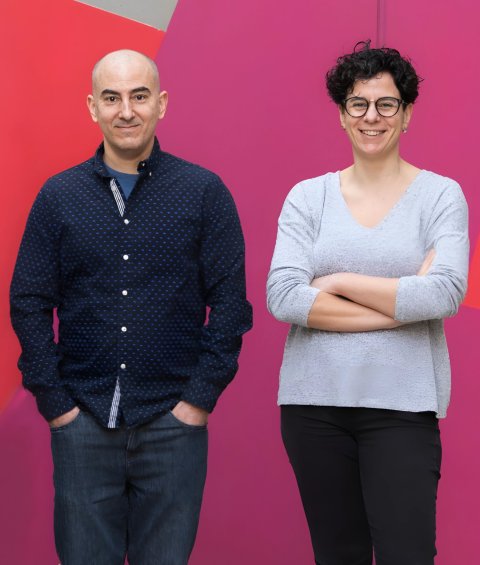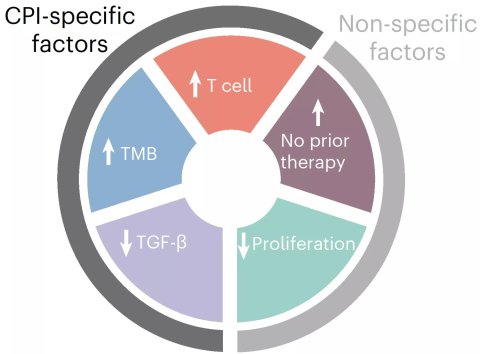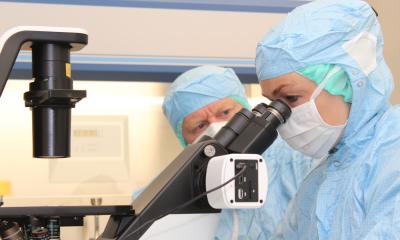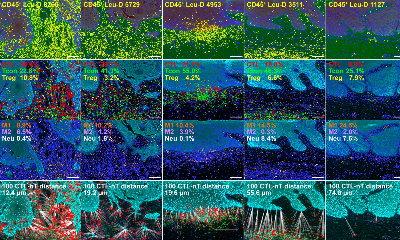News • Checkpoint inhibitor research
Five key factors predict response to cancer immunotherapy
Immunotherapy has transformed cancer treatment in recent years by enabling the immune system to attack tumour cells. However, only 20-40% of patients respond positively to immunotherapy, and these rates vary across different types of cancer.
Image source: Usset J et al., Nature Genetics 2024 (CC BY 4.0)
Predicting which patients will respond to immunotherapy and which will not is currently a highly active area of research. Numerous studies conducted so far have focused on the specific characteristics of tumours, their microenvironment, or the patient's immune system. As a result, which of the proposed biomarkers represent the same underlying factors or how many independent factors influence the effectiveness of this therapy remains unclear.
Researchers at the Institute for Research and Biomedicine (IRB) Barcelona have identified five key, independent factors that determine patients' response and survival after receiving checkpoint inhibitors (CPIs), a type of immunotherapy widely used in cancer treatment. These findings, published in Nature Genetics, provide a reference framework for current and future biomarkers of immunotherapy response. They could also, in the future, entail a pathway to a significant advancement in the personalisation of cancer treatments, helping to more accurately identify those patients who are likely to benefit from immunotherapy. The results suggest that patients with certain types of tumours, who are currently not considered candidates for immunotherapy (such as those with liver or kidney carcinomas) might benefit from this type of treatment.

Image source: IRB Barcelona
The team led by Dr. Núria López-Bigas and Dr. Abel González-Perez, from the Biomedical Genomics laboratory at IRB Barcelona, in collaboration with researchers from several international centres, has addressed this issue through a comprehensive analysis of genomic, transcriptomic, and clinical data from 479 patients with metastatic tumours, who received CPI treatment. These data are from a public database generated by the Dutch Hartwig Medical Foundation.
"We used an unbiased approach to analyse thousands of molecular and clinical features and identified five independent factors that influence response to immunotherapy and patient survival," explains Dr. López-Bigas, ICREA researcher at IRB Barcelona.

Image source: IRB Barcelona
The five factors identified are: tumour mutational burden; effective T cell infiltration; the activity of transforming growth factor beta (TGF-β) in the tumour microenvironment; previous treatment received by the patient; and tumour proliferative potential. These factors in different types of cancer are associated with the response to CPIs and have been validated by the authors in six independent cohorts, covering a total of 1,491 patients.
- Tumour mutational burden (TMB): Tumours with a high number of mutations tend to produce more neoantigens, making it easier for the immune system to recognise and attack them. TMB has been one of the most studied biomarkers for predicting response to CPIs.
- Effective T-cell infiltration: The presence of cytotoxic T-cells in the tumour is essential for the effectiveness of CPIs. This study has confirmed that a higher infiltration of these cells is directly related to a better response to the therapy.
- TGF-β activity in the tumour microenvironment: This factor influences the behaviour of some cells in the tumour microenvironment. High TGF-β activity can suppress the immune response, which is reflected in a tendency for patients to have poorer survival after immunotherapy treatment.
- Previous treatment: Patients who have received previous treatments tend to show a poorer response to immunotherapy.
- Tumour proliferative potential: Patients with tumours that have a high proliferative index, which tend to be more aggressive, generally show poorer survival after treatment.
This study represents an important step in understanding how different tumour characteristics influence treatment response. In the future, we hope that these five factors will be integrated into clinical practice to guide therapeutic decisions
Núria López-Bigas
These five factors provide a framework for organising the vast current knowledge about biomarkers of immunotherapy response. "So far, many studies have focused on identifying and reporting individual biomarkers, but our results suggest that many of these biomarkers might be different versions of the same underlying factors,” says Dr. González-Pérez.
Furthermore, the researchers demonstrated that a multivariate model combining these five factors allows for more accurate patient classification than using tumour mutational burden alone ( as is frequently done in clinical practice), predicting the probability of patients to respond to immunotherapy. This advance could have significant clinical implications in the future, as it could prevent patients with a low likelihood of response from experiencing the side effects of CPIs, which can lead to autoimmune diseases, and could also help reduce the cost of treatments.
One of the highlights of this study is the validation of these five factors in six independent cohorts of patients with cancers such as lung, colon, and melanoma. "We have confirmed that these factors are relevant in different types of cancer and different patient populations, thus reinforcing their clinical value. As research continues, new latent factors may be discovered in other types of cancer or larger cohorts," explains Dr. Joseph Usset, a former postdoc at IRB Barcelona who is now in the Computational Immunogenomics Group at Vall d'Hebron Institute of Oncology (VHIO).
The team hopes to have a larger volume of patient data in the future to create more accurate models. The accuracy of these models for potential future clinical application should be validated through prospective clinical trials. However, this advancement faces a significant challenge, namely the difficulty of accessing data as comprehensive and detailed as that used in this study. "This study represents an important step in understanding how different tumour characteristics influence treatment response. In the future, we hope that these five factors will be integrated into clinical practice to guide therapeutic decisions," concludes Dr. Lopez-Bigas.
Source: Institute for Research and Biomedicine (IRB) Barcelona
13.09.2024











